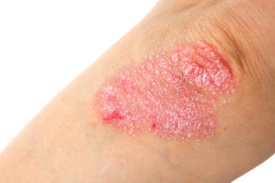We’ve all heard of psoriasis (suh-rahy-uh-sis), but did you know that it is the most prevalent autoimmune disease in the United States and according to current studies, affects 7.5 million Americans?
With August being National Psoriasis Awareness Month, we thought we’d look a little bit more in depth at psoriasis so we sat down for a Q&A with McFarland Clinic Dermatologist Laura Myers.
Q: What exactly is psoriasis and what causes it? Is it hereditary?
A: Psoriasis is a chronic skin disorder that is characterized by raised, red, scaly patches on the skin. While it’s not entirely known what causes it, there is definitely a genetic predisposition. In fact, 40% of patients with psoriasis have a first degree relative with psoriasis or psoriatic arthritis. Environmental and behavioral factors also contribute though. For example, several studies indicate that smoking is a risk factor.
Q: There are different types of psoriasis. Which ones are the most common?
A: Plaque psoriasis (pictured above) is the most common and accounts for 75-80% of psoriasis cases. These are the classic raised, red, scaly patches we think of with psoriasis. They can develop anywhere, but are most commonly found on the elbows, knees, shins, buttocks, scalp and back. Guttate psoriasis presents as small, dot-like lesions and accounts for around 10% of psoriasis cases. This type is usually seen in children or young adults. Less common forms of psoriasis include inverse, erythrodermic and pustular.
Q: What kinds of things might cause one’s psoriasis to flare up?
A: Some medications can cause flare ups, including beta-blockers, which are used to treat high blood pressure. Infections can often trigger flare ups as well. Strep throat, upper respiratory infections and HIV have all been known to make psoriasis worse. Lastly, stress. Patients often notice a significant relationship between flare ups and physical or psychological stressors, such as a major life event.
Q: Is there a cure for psoriasis? What do you do to help people suffering from it?
A: There is no cure for psoriasis yet. When I am talking with a new patient for the first time, I emphasize the goal of obtaining control. Treatment regimens are tailored to the patient depending on the location, the severity and their preferences.
For limited or mild to moderate cases we start with topical therapy. Creams and ointments can be a bit cumbersome and take some dedication from the patient, but can be very effective and have few side effects.
For moderate to severe psoriasis, or when topicals aren’t effective, we move on to oral or injectable treatments. These have an increased risk of side effects and aren’t for everyone, so this is a bigger discussion that reviews all of the pros and cons. It’s a decision that a doctor and a patient must make carefully together.
To learn more about psoriasis, please visit our interactive health library.

